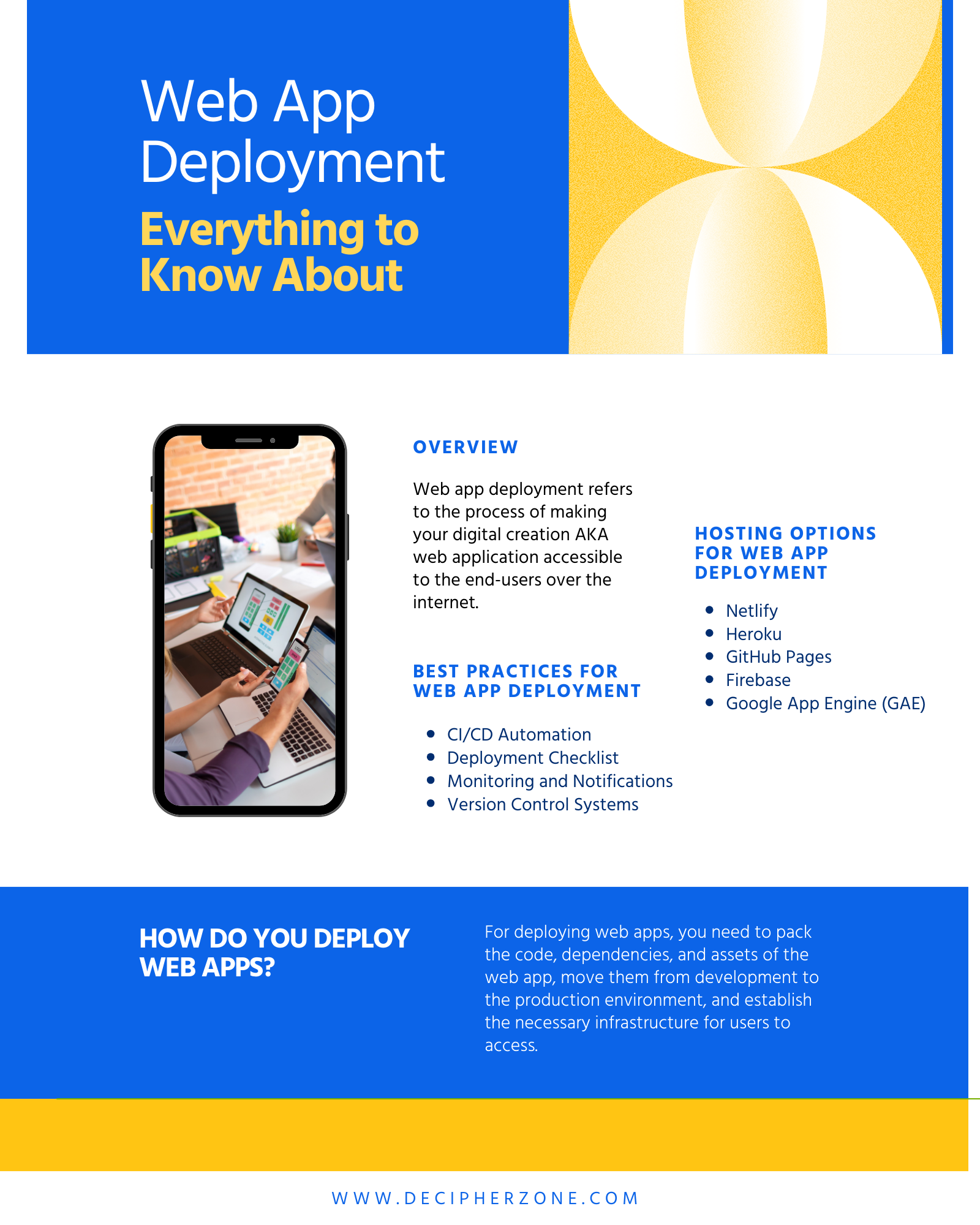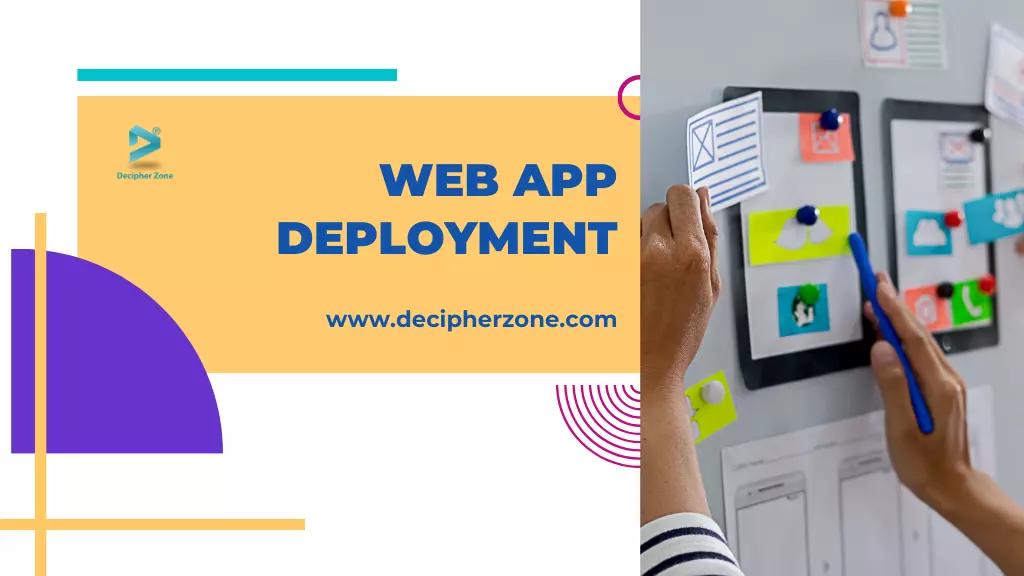The Ultimate Guide to Web App Deployment. Hosting Options for Web App Deployment. Best Practices for Web App Deployment.
A robust online presence has become crucial for organizations and businesses of all sizes. Web applications have become indispensable methods to achieve this goal because of their versatility and accessibility. But to bring the web app to life, it should be seamlessly deployed on the internet.
Whether you are a seasoned web developer or just dipping your toes into the world of web apps, you need to know all the essential aspects of web application deployment. To help you, we will cover everything from setting up the web application environment to choosing the ideal hosting platform.
But first, let’s understand what web app deployment is.
What is Web App Deployment?
Web app deployment refers to the process of making your digital creation AKA web application accessible to the end-users over the internet.
Typically web app deployment involves several inter-connected activities or processes with possible transactions between them. Put simply, web app deployment entails all the processes required to build a web app or update it for the users to interact.
Web app deployment involves packaging the code, dependencies, and assets of the web app, moving them from development to the production environment, and establishing the necessary infrastructure for users to access.
The deployment process entails activities such as web server configuration, database management, setting domain names, and maintaining web app scalability.
Read more: Best Tech Stack for Web App Development
Hosting Options for Web App Deployment
Some of the popularly used web app deployment hosting platforms that you can go for are:
-
Netlify
-
Heroku
-
GitHub Pages
-
Firebase
-
Google App Engine (GAE)
Netlify
It is a modern web development and deployment platform with outstanding features. Netlify comes with built-in CI/CD to set up code in GitHub or other version control, domain and DNS management, cloud-scale serverless functions, plugins, identify & authentication, forms, analytics, and budget-friendly pricing plan.
Heroku
It is a cloud-based, platform-as-a-service that enables developers to develop, operate, and run web apps in the cloud. It supports multiple programming languages like Python, Go, Java, Node.js, etc. Some of its key features are full-stack deployment, add-ons like email and database, CI/CD, code & data rollback, buildpacks, and app metrics.
GitHub Pages
It is a static hosting service that takes files directly from GitHub repositories, runs them through the build process, and publishes them. GitHub Pages have some key features including simplicity, security, custom URLs, and Documentation-Driven Sites.
Firebase
It is a platform by Google that helps developers host, build, and ship applications for Android, iOS, web, Unity, C++, etc. Some of the features and advantages of Firebase are a real-time database, authentication providers, analytics, rich utilities, a free plan, etc.
Google App Engine (GAE)
It is a platform offered by Google Cloud Platform (GCP) that supports developers in creating scalable web and mobile apps’ backends using any programming language.
GAE is a serverless platform with features like docker support, managed servers, multiple programming languages support, app diagnostics, etc. Being a part of GCP, GAE helps connect to other Google Cloud Services with ease.
Read More: Top Reasons to Invest in Web App Development
Some of the other web app deployment hosting platforms you can choose from are Vercel, AWS Amplify, DigitalOcean, Surge, Render, and more.

Best Practices for Web App Deployment
Now that we have a better understanding of what web app deployment is and available hosting platforms, let’s dive into the best practices to follow for successful web app deployment.
CI/CD
Automation has become a critical part of modern app development. One of the best ways to achieve automation in web app deployment is through continuous integration and continuous deployment (CI/CD) pipelines. It automated the testing and deploying process while minimizing human error and making the processes highly efficient.
Deployment Checklist
Another common practice to implement while web app deployment is to maintain a good checklist. A few main checklist items are:
-
Check database script, create rollback plan, and keep release notes ready.
-
Build passes automated, unit, and integration tests.
-
Monitor logs, and check the working of third-party integrations and APIs.
-
Environment variables like secrets, and API keys are correctly managed.
Monitoring & Notifications
Once the application is deployed, monitoring becomes crucial to deal with incoming HTTP requests, and keep track of performance, error rates, etc. Also, apart from monitoring the application performance, it should send immediate notifications about the issue. Datadog, Prometheus, New Relic, etc. are the top tools that can be used for monitoring and alerts.
Use Version Control Systems
Using systems like GitLab and Git allows developers to track changes, maintain update history, and collaborate effectively. It also makes it easier to revert changes in case of bugs and errors, making the development and deployment process more secure and manageable.
Read More: How Much Does it Cost to Develop a Web App
Conclusion
Deployment is one of the most crucial phases of web application development. Once you get a hold of how to package and deploy your web app in the production environment, the chances of your app getting success get higher.
But remember that deployment is just one of the web app development lifecycle phases. To keep the web app thriving in the long run, you must continuously monitor, gather feedback, and improve its features and functionalities.
So, that was all about web app deployment. We hope you find the blog insightful and helpful for your future project. And, if you are a business owner looking for a web developer to build a solution for your business, then contact us now!
FAQs: Web App Deployment
What is a web application deployment?
Web app deployment refers to the process of making your digital creation AKA web application accessible to the end-users over the internet.
How do you deploy web apps?
For deploying web apps, you need to pack the code, dependencies, and assets of the web app, move them from development to the production environment, and establish the necessary infrastructure for users to access.
What are the hosting options for web app deployment?
Netlify, Heroku, GitHub Pages, Firebase, and Google App Engine (GAE) are some of the web app hosting platforms that you can use.

